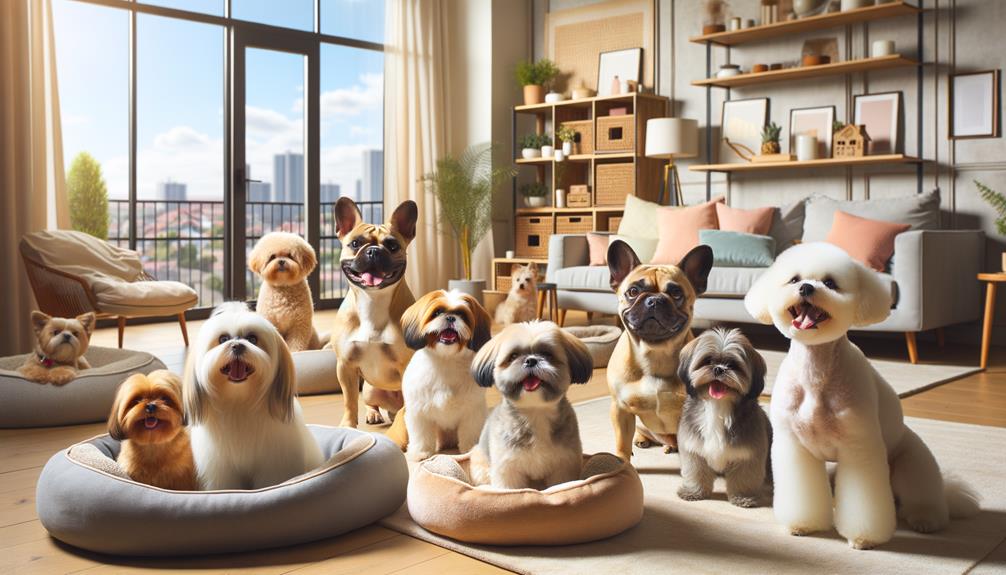You've moved into an apartment and now you're considering adding a four-legged friend to your family. It's crucial to note, not all dogs are suited for apartment life. Certain breeds, such as the adaptable Bichon Frise or the compact Boston Terrier, are known for their compatibility with smaller spaces. But how do you determine which dog breed is the perfect fit for your apartment lifestyle? Stick around, and we'll explore the characteristics and needs of various breeds to help you make an informed decision.
Key Takeaways
- Apartment-friendly breeds include the Bichon Frise, French Bulldogs, Cavalier King Charles Spaniel, and Boston Terrier due to their adaptability.
- Shih Tzu, Bulldog, Pugs, Dachshund, Cocker Spaniels, Miniature Schnauzer, Pomeranian, and Italian Greyhound are also suitable for apartment living.
- Consideration of the breed's temperament, energy level, hypoallergenic qualities, noise level, and exercise needs is crucial for apartment living.
- Regular grooming, diet monitoring, and exercise are essential maintenance aspects for breeds like Shih Tzu, Pomeranian, and Miniature Schnauzer.
- Italian Greyhounds and Pomeranians require specific care like dental maintenance, injury protection, mental stimulation, and portion control for a balanced diet.
Understanding the Criteria
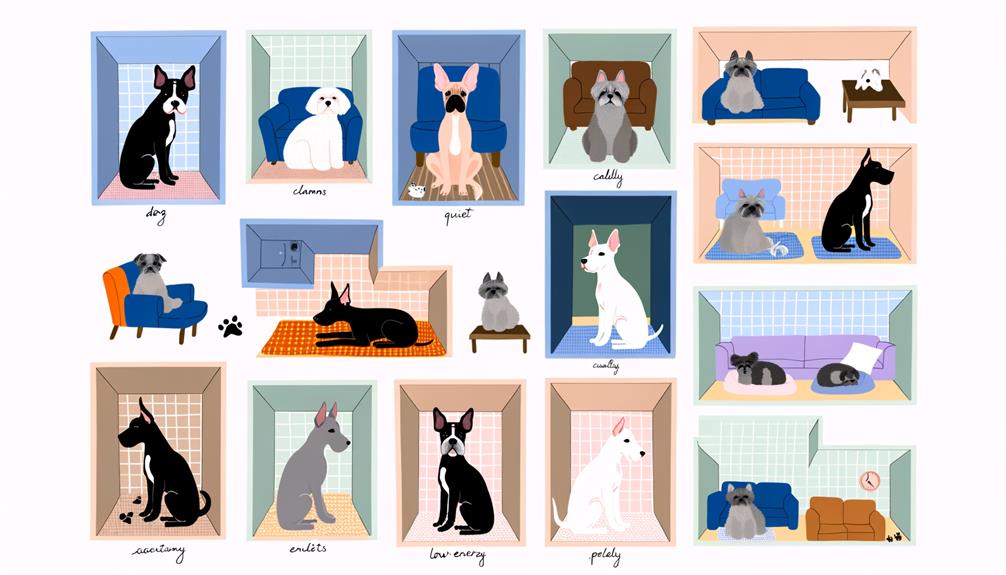
Before diving into the list of dog breeds suitable for apartment living, it's crucial you grasp the key factors that make a breed apartment-friendly. It's not just about the dog's size; you need to consider a breed's temperament, energy level, and even potential dog allergies.
Some dog breeds are hypoallergenic, meaning they're less likely to cause allergic reactions. This is an important consideration if you or a family member are allergy sufferers. You don't want a dog that's going to make you sneeze, itch, or swell up every time you're around them.
Noise regulations are another crucial factor in apartment living. You're sharing walls with neighbors, and it's important to respect their peace and quiet. Some dog breeds are known for being quiet and calm, while others have a reputation for being loud and boisterous. Researching the typical behavior of a breed can help you determine if they'd be a good fit for your living situation.
Lastly, the dog's exercise needs should be considered. A high-energy breed may not be the best choice for an apartment unless you can provide them ample opportunities for physical activity. Understanding these factors will guide your selection process.
The Adaptable Bichon Frise
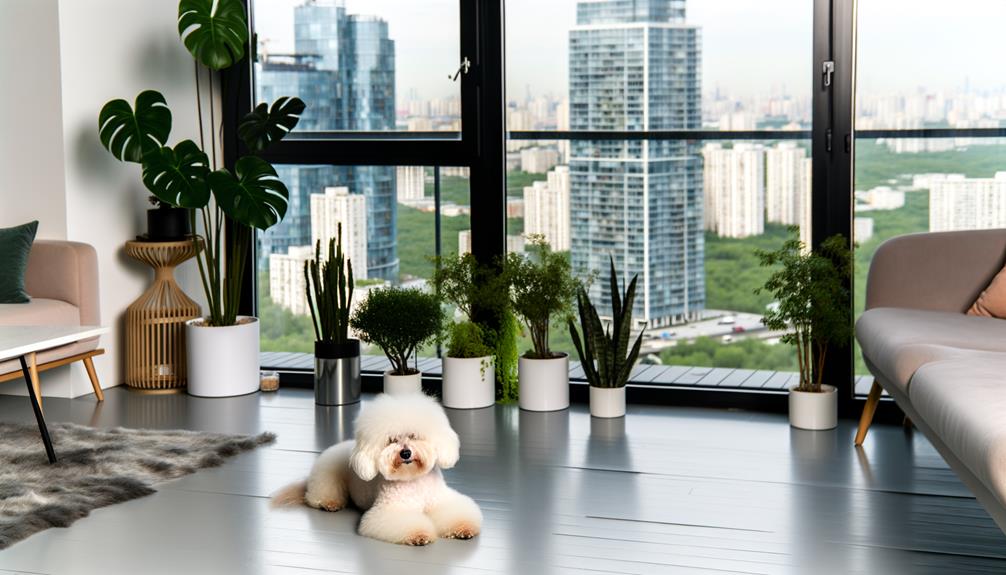
Despite its small size, the Bichon Frise is a breed that's known for its adaptability, making it a perfect companion for apartment living. They're not only compact and easy to carry, but they're also a quiet breed that won't disturb your neighbors.
Bichon Frise grooming is something you'll need to consider. This breed has a thick, curly coat that requires frequent brushing to prevent matting. You'll also need to schedule regular grooming appointments to keep their fur looking its best. Don't worry, though, as they typically enjoy the attention and pampering that comes with grooming.
As for Bichon Frise training, they're known for being intelligent and quick to learn. You'll have a relatively easy time teaching your Bichon basic commands and even some fun tricks. However, they can be a bit stubborn at times, so patience is key here.
The Bichon is also known for being friendly and sociable. They get along well with people and other pets, making them an ideal choice for those who enjoy hosting guests or have other pets in the home. With their adaptable nature and charming personality, the Bichon Frise makes apartment living a breeze.
French Bulldogs: Small but Mighty
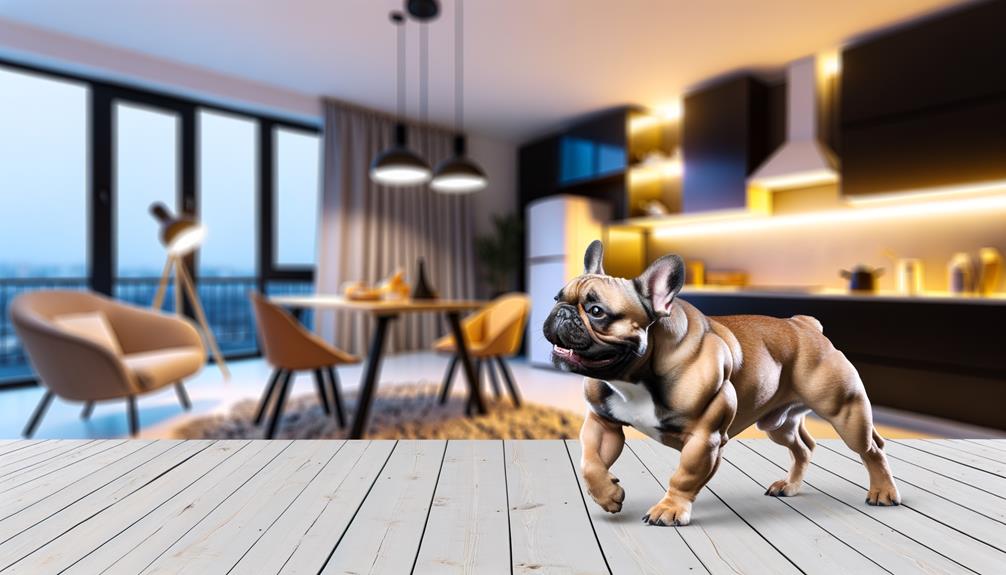
Shifting our focus from the fluffy Bichon Frise, let's take a look at another small breed that's well-suited for apartment living: the mighty French Bulldog. These compact dogs are known for their muscular bodies, bat-like ears, and charming, easy-going natures.
The French Bulldog's size makes them perfect for apartment living. They're small but mighty, able to adapt to smaller spaces without losing their zest for life. Despite their strength and vigor, it's important to keep a close eye on French Bulldog health. They're prone to certain conditions like hip dysplasia and brachycephalic syndrome due to their unique physical features. Regular vet check-ups, a balanced diet, and moderate exercise will help keep your French Bulldog healthy and happy.
When it comes to training techniques, French Bulldogs are known to be stubborn. But don't let that discourage you. They're also very intelligent and eager to please their owners. Positive reinforcement methods work best with this breed. Praise, treats, and plenty of love will encourage your Frenchie to follow commands. Just remember, patience and consistency are key.
In short, French Bulldogs are a compact, charming, and resilient breed, making them a great choice for apartment dwellers.
The Gentle Cavalier King Charles Spaniel
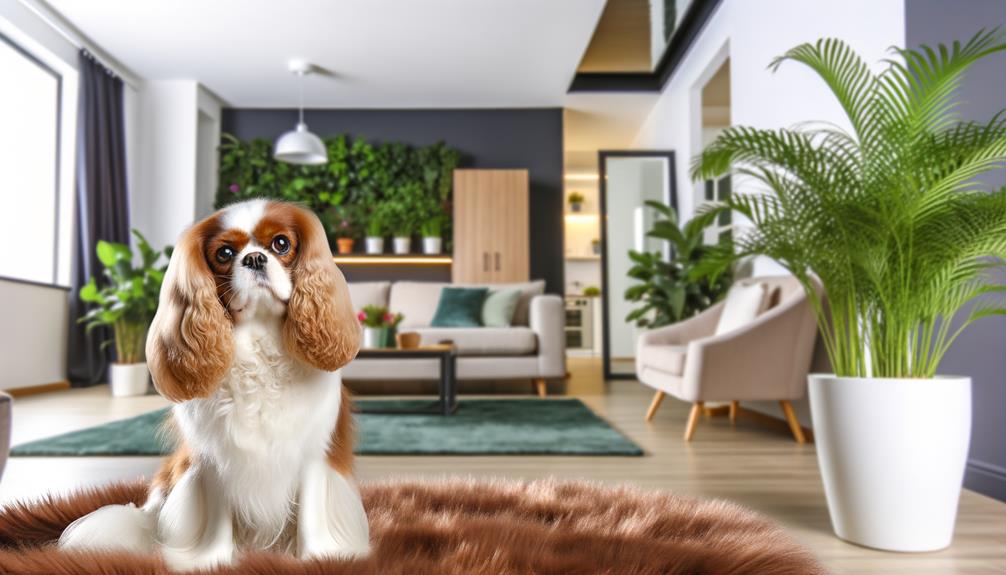
Next on our list of apartment-friendly breeds is the gentle Cavalier King Charles Spaniel, a breed renowned for its affectionate nature and adaptability to small living spaces. This breed's sweet disposition makes them a joy to have around, and their size is perfect for apartment living.
When it comes to the Cavalier King Charles Spaniel's grooming needs, they're relatively low maintenance. Their silky coat does require regular brushing to prevent mats and tangles, but they don't need frequent haircuts like some other breeds. Bathing can be done as needed, and regular ear cleaning is essential to prevent infections.
However, it's worth noting some Spaniel's health issues. While they're generally healthy, they're prone to certain conditions like heart disease and hip dysplasia. Regular vet check-ups and a good diet can help keep these issues at bay.
Despite these health concerns, the Cavalier King Charles Spaniel is a fantastic companion for apartment dwellers. They're quiet, rarely bark, and tend to get along well with other pets and people. Their adaptable, loving nature makes them one of the best breeds for apartment living. Just remember, they thrive on companionship, so they're happiest when they're with you.
The Compact Boston Terrier
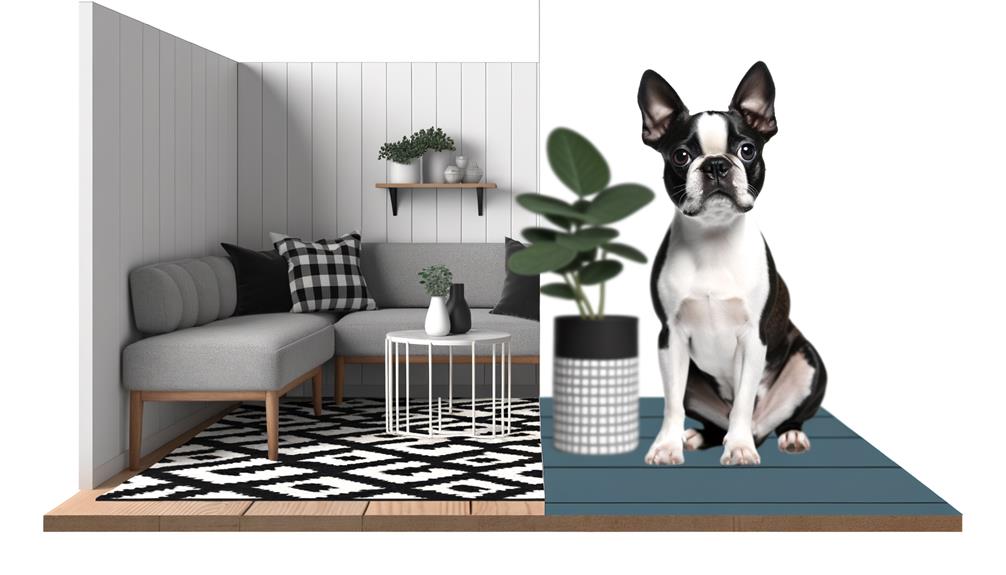
Let's shift our focus to the compact Boston Terrier.
You'll find their temperament to be a delightful blend of energetic and gentle, making them perfect for apartment living.
But how much space does this small, lively breed require?
Let's discuss.
Boston Terrier Temperament
You'll find the Boston Terrier's temperament to be as compact and charming as their size, making them a great fit for apartment living. They're known for their friendly disposition, intelligence, and adaptability. However, like any breed, they've specific traits that need attention.
- Boston Terrier's Health Concerns: They're generally healthy, but they're prone to certain genetic health problems. Regular vet check-ups are essential.
- Training Boston Terriers: This breed is intelligent and eager to please, making training relatively easy.
- Socialization: They're sociable dogs and need regular interaction with humans and other pets.
- Exercise: Despite their small size, they need regular exercise to stay healthy and happy.
Space Requirements
Despite their small stature, Boston Terriers require a decent amount of space to explore and play in your apartment. They're compact, yes, but don't let that fool you into thinking they don't need room to roam. Your Boston Terrier's diet can influence their energy levels, so a balanced dog diet is key to managing their space requirements. High-energy foods may lead to a more lively pup, requiring more space for activities.
Noise management also ties into space requirements. Boston Terriers can get a bit noisy when they're bored or confined. Giving them enough space to play and expend energy can help keep the noise down. Remember, a happy Boston Terrier is a quiet, and space-satisfied Boston Terrier.
The Quiet Shih Tzu
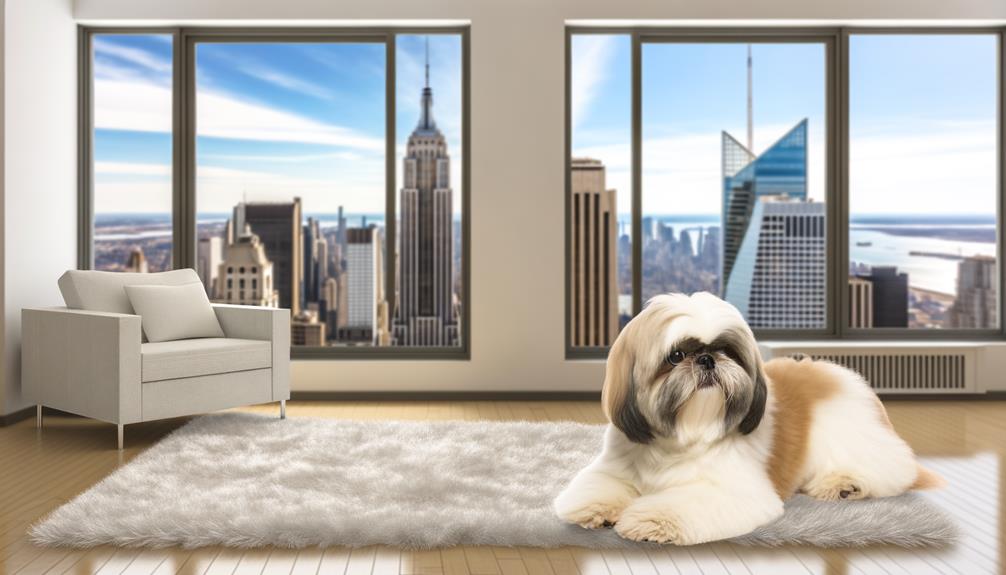
You might be considering the Shih Tzu as your apartment companion, given their known quiet demeanor. Familiarizing yourself with their temperament and maintenance needs will be essential.
Shih Tzu Temperament
Known for their calm and friendly nature, Shih Tzus make a perfect pet for apartment living. They're quiet dogs who don't require a lot of space, making them ideal for smaller homes. Shih Tzus also have a relatively low energy level, which means they're not going to be bouncing off your apartment walls.
Here are four key points about Shih Tzus:
- Shih Tzu grooming: Their long, silky hair needs regular grooming. Keep in mind grooming isn't just about aesthetics, it's also crucial for their health.
- Shih Tzu health: They're generally a healthy breed but can be prone to certain issues like eye and breathing problems.
- They're sociable dogs who love to be around their human family.
- They're known for their adaptability, adjusting well to different living situations.
Shih Tzu Maintenance
Maintaining your Shih Tzu's health and happiness, particularly in an apartment setting, involves understanding their unique needs and behaviors. Shih Tzu grooming is essential due to their long, silky coat. Regular brushing prevents matting and keeps their coat healthy. They don't shed much, which is a bonus for apartment living.
When it comes to a Shih Tzu diet, they're prone to obesity. Monitor their food intake and ensure they get regular exercise. A balanced diet full of essential nutrients is key. Add in vet visits for regular check-ups and vaccinations.
The Low-Energy Bulldog
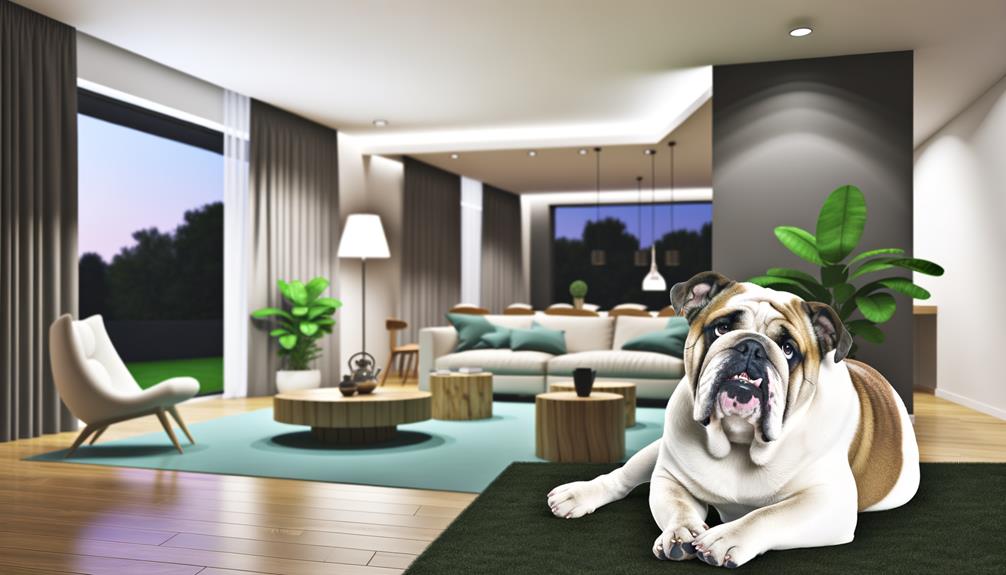
Despite their muscular build, bulldogs aren't demanding when it comes to exercise, making them ideal for apartment living. They're calm and composed, perfectly content with lounging around your living room. However, don't let this fool you into thinking that Bulldog Training or Bulldog Health maintenance is a walk in the park.
Here are 4 considerations for bulldog care:
- Bulldog Training: Bulldogs may not be energetic, but they're notoriously stubborn. You'll need patience and consistency to train them. Reward-based training works best with this breed.
- Bulldog Health: Bulldogs have a few health issues due to their distinct physique. Regular vet check-ups are essential to keep them healthy.
- Diet: Bulldogs love to eat and can easily become overweight. You'll need to monitor their diet closely.
- Exercise: Though they don't require much physical activity, a short daily walk will help maintain their weight and overall health.
Pugs: Perfect for Apartments

If you're looking for a cheerful, affectionate breed that's well-suited to apartment living, look no further than the pug. Pugs are small, sturdy dogs with a big personality packed into a compact frame. They're known for their friendly disposition and love of people, making them great companions for apartment dwellers.
When it comes to pug nutrition, it's essential to keep an eye on their diet. Pugs love to eat and can easily become overweight if not monitored. Feed them high-quality dog food in proper portions to ensure they're getting the right nutrients without the extra calories. It's also a good idea to include regular exercise in their routine to keep them healthy and fit.
Pug grooming is fairly straightforward. Their short coat requires minimal grooming, but they do shed, so regular brushing will help keep your apartment clean. Pugs also have wrinkles on their face, which need to be cleaned regularly to prevent infection.
The Versatile Dachshund
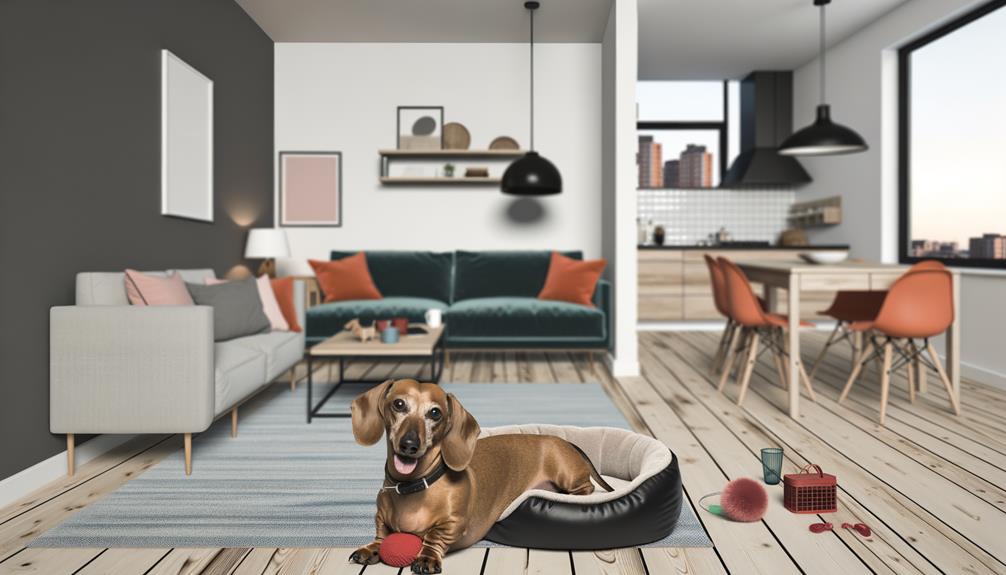
Switching gears from the friendly pug, let's explore another breed that's perfect for apartment living: the versatile dachshund. These small dogs are known for their spirited personalities and love of playtime. However, they're not just all fun and games. They're also excellent companions, with a fierce loyalty to their owners.
When it comes to Dachshund Health Concerns, it's important to be aware:
- Back Issues: Dachshunds are prone to back problems due to their long bodies.
- Obesity: They love to eat and can quickly become overweight if not monitored.
- Dental Problems: Regular teeth cleaning is a must.
- Exercise Needs: Despite their size, they require ample exercise to stay healthy.
As for Dachshund Training Tips, they're known for their stubbornness, which can make training a bit challenging. Here are a few pointers:
- Start Early: Train them as puppies.
- Be Consistent: Use the same commands and rewards.
- Patience is Key: They're stubborn, so take it slow.
- Stay Positive: Positive reinforcement works best with this breed.
The dachshund is a great apartment dog, full of character and charm. They'll definitely keep you on your toes, but the love and loyalty they give in return make them well worth it.
Cocker Spaniels: Small Space Companions
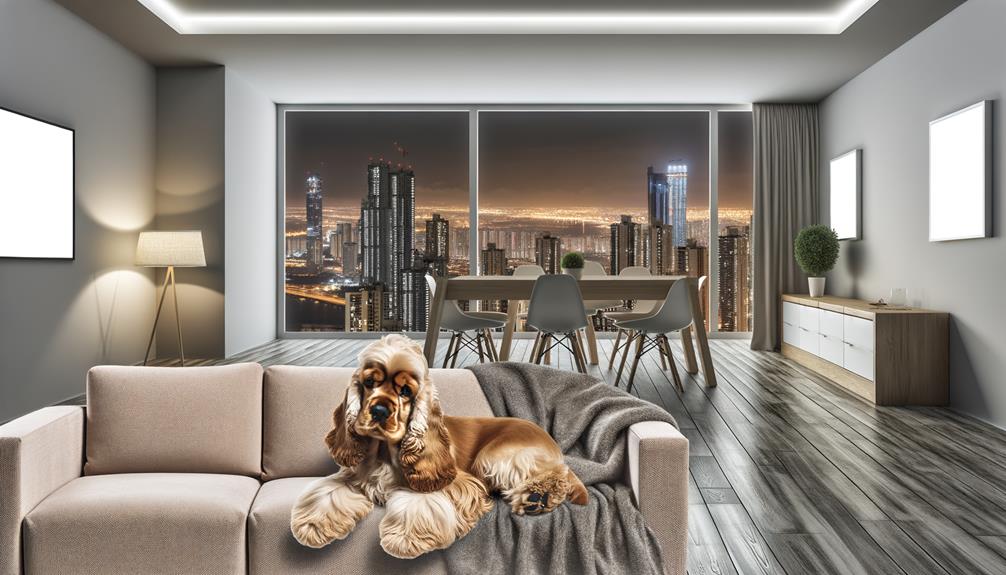
Moving on to the next breed, you'll find that Cocker Spaniels make fantastic small space companions. Despite being small, they're full of life and have a vibrant personality that's contagious. Their size is perfect for an apartment, and they won't make you feel cramped.
Cocker Spaniels are known for their sociability. They're friendly, love being around people, and get along well with other pets. They not only adapt well to apartment living but also make it a joyful experience with their playful nature. They're great companions for kids and adults alike, making them a popular choice for families.
However, don't forget about the Cocker Spaniel's grooming needs. They've a beautiful coat that requires regular grooming to keep it healthy and shiny. Brushing their coat several times a week is a must to avoid tangles and matting. Regular baths, nail trims, and ear cleanings are also part of their grooming routine.
While Cocker Spaniels are a bit high maintenance in terms of grooming, their sociability, adaptability, and love for their owners make them worth the effort. You'll find that this breed's companionship and love are more than enough compensation for their grooming needs.
The Loyal Maltese
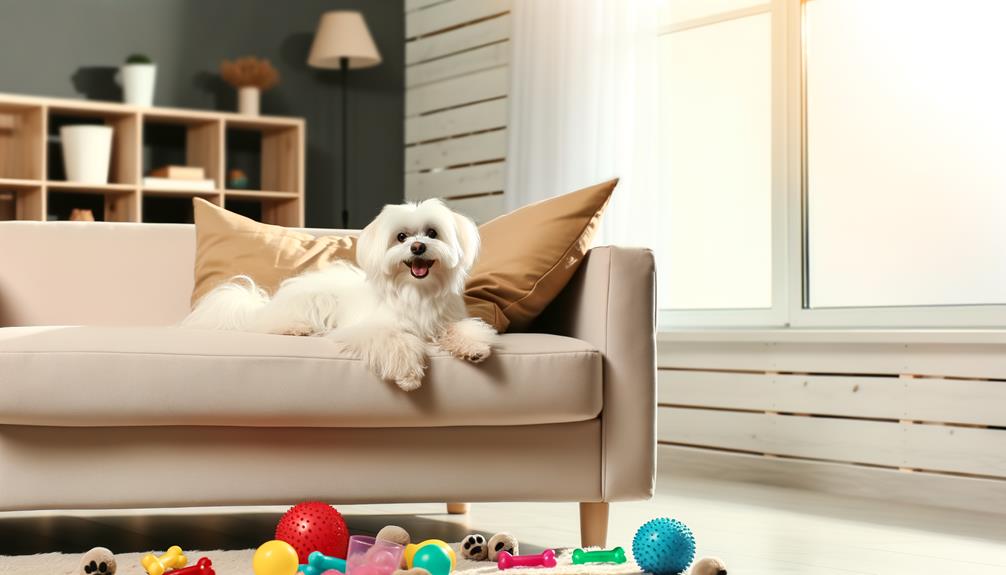
Diving right into the heart of apartment-friendly breeds, let's uncover the charm of the loyal Maltese. This breed is known for its loyalty, friendliness, and adaptability making it an excellent choice for apartment dwellers. Maltese are small dogs, typically weighing less than seven pounds, but they're packed with personality.
Here are four great reasons why a Maltese could be your perfect apartment companion:
- Size: Their small stature makes them ideal for apartments. They won't take up much space and are easy to manage.
- Temperament: Maltese are friendly, affectionate, and get along well with other pets and people.
- Grooming: Regular Maltese grooming is essential, but they're hypoallergenic, meaning they won't trigger allergies.
- Training: A Maltese is intelligent and eager to please, making Maltese training relatively easy.
Despite their royal appearance, they're not high-maintenance divas. They'll happily sit on your lap during your Netflix binge or join you for a stroll around the block. Their size, temperament, and grooming needs make them a prime candidate for apartment living. Easy to train and extremely loyal, a Maltese could be just the companion you're seeking.
The Peaceful Havanese
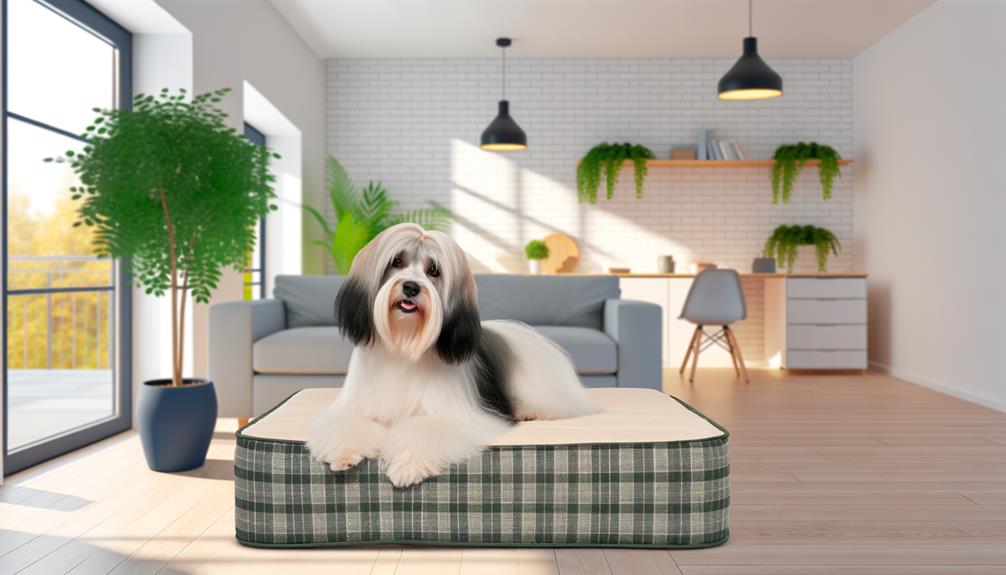
While the Maltese might've won you over with its charm, another breed you should definitely consider for apartment living is the peaceful Havanese. Originally bred in Cuba, these pups are compact, sturdy, and have a playful nature, making them perfect for smaller spaces.
Havanese grooming requires a bit more effort due to their long, silky coats. Regular brushing is essential to prevent matting and maintain their fluffy appearance. Due to their love for play, they can get a bit dirty, so baths are also on the cards.
As for Havanese health issues, they're generally a healthy breed. However, like all dogs, they can be prone to certain ailments. Regular vet check-ups are key to catching any potential issues early, like hip dysplasia or eye problems.
Despite these considerations, the Havanese's lovable nature and adaptability make them an excellent choice for apartment dwellers. They're sociable, get along well with other pets, and are known for their gentle demeanor. They're not overly noisy either, so you won't have to worry about disturbing your neighbors. With proper care, you could enjoy the company of your Havanese for up to 14-16 years.
The Miniature Schnauzer: An Ideal Choice
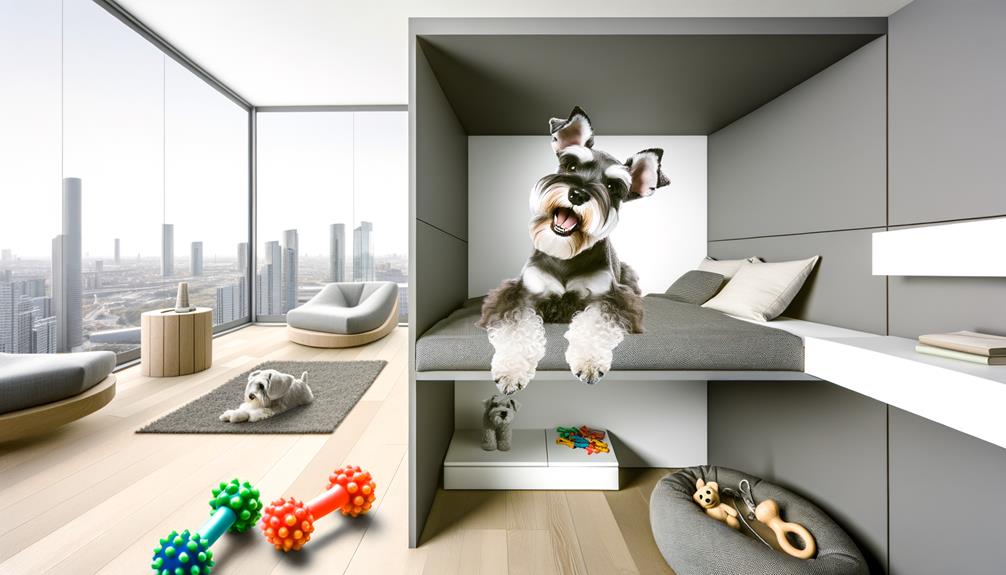
If you're seeking a small, robust, and spirited companion, the Miniature Schnauzer could be the ideal choice for your apartment lifestyle. This breed is known for its intelligence, adaptability, and affectionate nature.
Here are four reasons why the Miniature Schnauzer could be a great fit for you:
- Size and Energy Level: Miniature Schnauzers are small but energetic dogs, perfect for apartment living. They're happy with short walks and indoor playtime.
- Adaptability: They can adjust well to different environments and are fairly quiet, making them good neighbors in an apartment setting.
- Schnauzer Grooming: Although they need regular grooming, their hair doesn't shed much, which is great for keeping your apartment clean.
- Schnauzer Diet: Miniature Schnauzers do well on a balanced diet. A vet can guide you in choosing the right food to keep them healthy.
The Apartment-Friendly Pomeranian
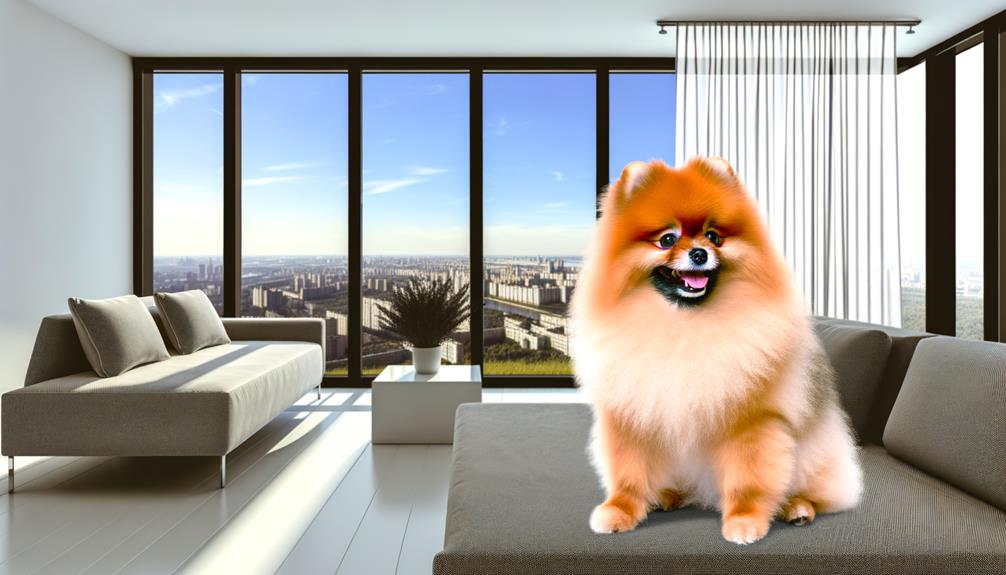
You might be surprised to learn that Pomeranians can be great apartment dogs.
Let's discuss their size, noise level, and exercise needs to understand why.
It's important to know what to expect before bringing this fluffy friend into your apartment.
Pomeranian's Size and Space
Often, a Pomeranian's small size makes it an ideal pet for apartment living. Despite their lively personalities, these little dogs don't need much room to move around. However, there are four key factors that contribute to their suitability:
- Size: Pomeranians typically weigh between 3 to 7 pounds, which means they occupy minimal space.
- Exercise: They need regular but not excessive exercise, which you can easily provide within an apartment.
- Pomeranian Grooming: Despite their fluffy coats, a simple brushing routine keeps them tidy.
- Pomeranian Diet: Pomeranians eat small quantities, so storing their food won't take up much room.
Pomeranian's Noise Level
While Pomeranians may be compact and easy to care for, it's also important to consider their noise levels when thinking about apartment living. These spirited little dogs are known for their vocal nature which can be a concern in close quarters. Training from a young age can help moderate their barking, but you'll need patience.
Alongside noise considerations, you should also factor in Pomeranian's grooming needs. Their fluffy double coat requires frequent brushing to avoid matting and shedding. Likewise, Pomeranian's dietary requirements are crucial. They typically need a high-quality diet to maintain their energy and coat health.
Pomeranian's Exercise Needs
Despite their small size, Pomeranians still need regular exercise to stay healthy and happy. They're notorious for their energy and curiosity. Here's what you should keep in mind for your Pomeranian's exercise routine:
- Daily Walks: Pomeranians need at least one walk per day. It helps them burn off energy and stimulates their minds.
- Play Sessions: They love to play, so make sure to set aside time for games.
- Pomeranian Training: Training sessions, like obedience or trick training, can be a great form of mental exercise.
- Pomeranian Grooming: Regular grooming can also count as exercise. Brushing or bathing your Pomeranian can help keep them active and healthy.
The Charming Italian Greyhound
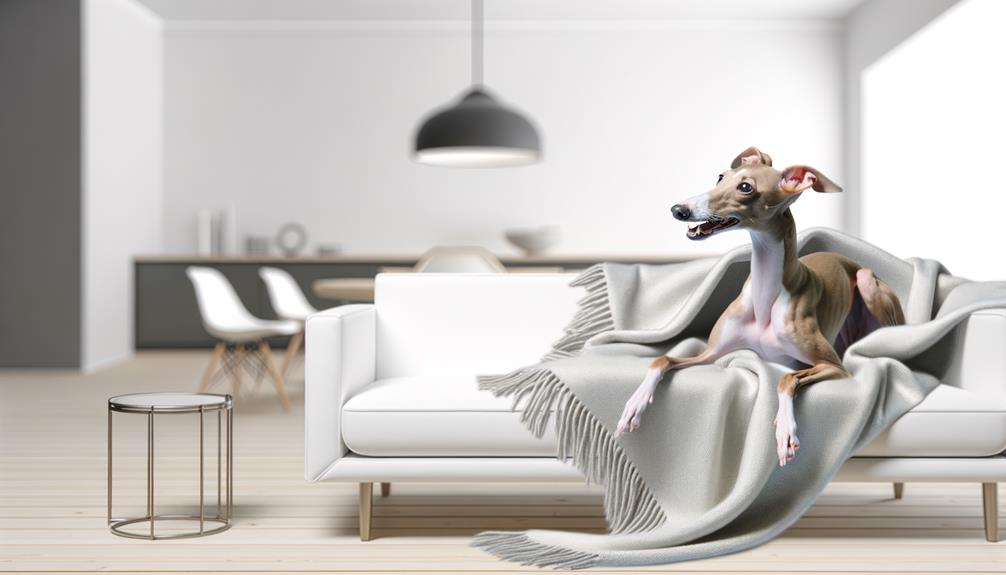
If you're searching for a dog breed suited to apartment living, you'll find the charming Italian Greyhound to be a perfect fit. This petite, 14-inch tall pooch barely tips the scales at 15 pounds, making it an ideal size for small spaces. But don't be fooled by its size, this breed is full of personality and love.
The Italian Greyhound diet is essential to its well-being. They're prone to obesity, so portion control and a balanced diet are key. Consult with your vet to determine the best type of food and feeding schedule for your pet.
Like any breed, the Italian Greyhound has its own set of health concerns. They're known for their dental issues, so a regular cleaning routine is crucial. Additionally, their delicate, thin skin makes them more susceptible to injuries and weather extremes. You'll need to be mindful of their surroundings and ensure they're kept warm during colder months.
In spite of these concerns, with the right care and attention, you can ensure your Italian Greyhound remains a healthy and happy member of your apartment family. These dogs are known for their affectionate nature, and will quickly become a cherished companion in your small living space.
Frequently Asked Questions
Whats the Best Way to Acclimate a Dog to Apartment Living?
To acclimate your dog to apartment living, you'll need to incorporate dog socialization techniques. Gradually expose them to apartment noise, ensuring they're comfortable. Reward them for calm behavior, promoting peace with the surrounding noise.
Are There Any Specific Health Issues Associated With Apartment-Friendly Dog Breeds?
Sure, specific health issues can potentially affect any dog breed. However, you can alleviate concerns with breed specific nutrition and mental stimulation strategies, tailored to your pup's unique needs and environment.
How Often Should Apartment-Friendly Dog Breeds Be Exercised?
You should exercise your dog daily, regardless of breed. Indoor exercise options can be handy for rainy days. Behavioral training techniques also provide mental stimulation, which is just as important for your dog's overall health.
What Is the Average Cost of Owning One of These Apartment-Friendly Dog Breeds?
The average cost of owning a dog varies, but you'll likely face insurance costs and grooming expenses. For small breeds, insurance is often cheaper and grooming can range from moderate to high depending on the breed.
Are There Any Dog Breeds That Are Hypoallergenic and Suitable for Apartment Living?
Yes, there are hypoallergenic dog breeds that'll fit your apartment lifestyle. Consider breeds like Bichon Frise or Miniature Schnauzer. These breeds have a suitable temperament and manageable grooming needs for apartment dwellers like you.
Conclusion
Choosing the perfect dog breed for your apartment lifestyle doesn't have to be tough. Breeds like the Bichon Frise, French Bulldogs, and Cavalier King Charles Spaniel are adaptable and low-energy, ideal for apartment living.
The Havanese, Miniature Schnauzer, Pomeranian, and Italian Greyhound also make great companions with the right care. Remember, your furry friend's happiness hinges on proper attention to their specific needs.
So, pick wisely and have a wonderful pet-friendly apartment experience.

